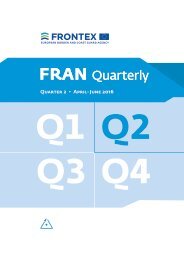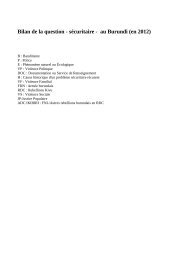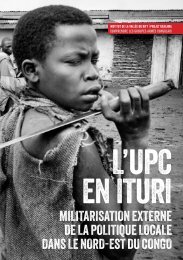Create successful ePaper yourself
Turn your PDF publications into a flip-book with our unique Google optimized e-Paper software.
DAVID POLLOCK<br />
Ramadi, or Fallujah offer varying accounts of their previous lives under IS<br />
and of their reasons for escaping. They are as likely to focus on the fear of<br />
getting caught in the crossfire as on the brutality or deprivation of IS rule.<br />
The prisons and mass graves IS leaves behind are grim mementos of the coercive<br />
aspect of its control. Yet some people reportedly continue to come and<br />
go from Mosul nearly every day, venturing out from IS territory and then,<br />
more-or-less voluntarily, returning to it.<br />
The lessons for other IS provinces appear to be as follows: the Islamic<br />
State rules mainly by intimidation or acquiescence, not by active popular<br />
support. But even if many residents are not active IS supporters, they are<br />
unlikely to rise up in active opposition. And a crucial issue for these subjugated<br />
populations is the classic “compared to what” question: is the plausible<br />
local alternative to IS likely to be any better for them?<br />
Solid anecdotal reporting from analogous but non-IS areas, especially African<br />
al-Qaeda or similar jihadist-contested zones, tends to support this intimidation<br />
interpretation. In February 2016, the author heard convincing testimony<br />
to this effect from other participants in the Marrakech Security Forum<br />
on “Countering Jihad in Africa.” Rahma Dualeh, the Somali Countering Violent<br />
Extremism (CVE) coordinator for the European Union mission in Nairobi,<br />
noted that even now in Mogadishu, where al-Shabab has been largely<br />
pushed out, many residents obey its declared school or other holidays rather<br />
than the official ones—just in case those jihadists return with a vengeance.<br />
Similarly, the senior Chadian police commander asserted that nearly 100 percent<br />
of all the cigarettes sold in the Sahel are smuggled—and that al-Qaeda in<br />
the Islamic Maghreb (AQIM) or related groups control the smuggling routes.<br />
Without another option, all the smokers in the region are almost literally<br />
addicted to accepting at least some jihadist presence in their lives.<br />
Fortunately, and very surprisingly, the picture is much brighter in many<br />
neighboring areas that have not fallen under IS control. Here, substantial<br />
survey data is available, especially from polls supervised by the author in September<br />
2014 and September 2015, along with other polls conducted by Pew,<br />
Gallup, Zogby, and several other polling organizations in the past two years.<br />
Without exception, these polls show that in key Arab Sunni societies like<br />
Egypt, Morocco, Saudi Arabia, Jordan, Kuwait, or the United Arab Emirates,<br />
a mere 5 percent or less voice any approval for IS. Significantly, this is as<br />
true for the youth cohort as for its elders. Moreover, this tiny proportion of<br />
popular sympathy for IS has actually decreased rather than increased during<br />
the past two years.<br />
62






